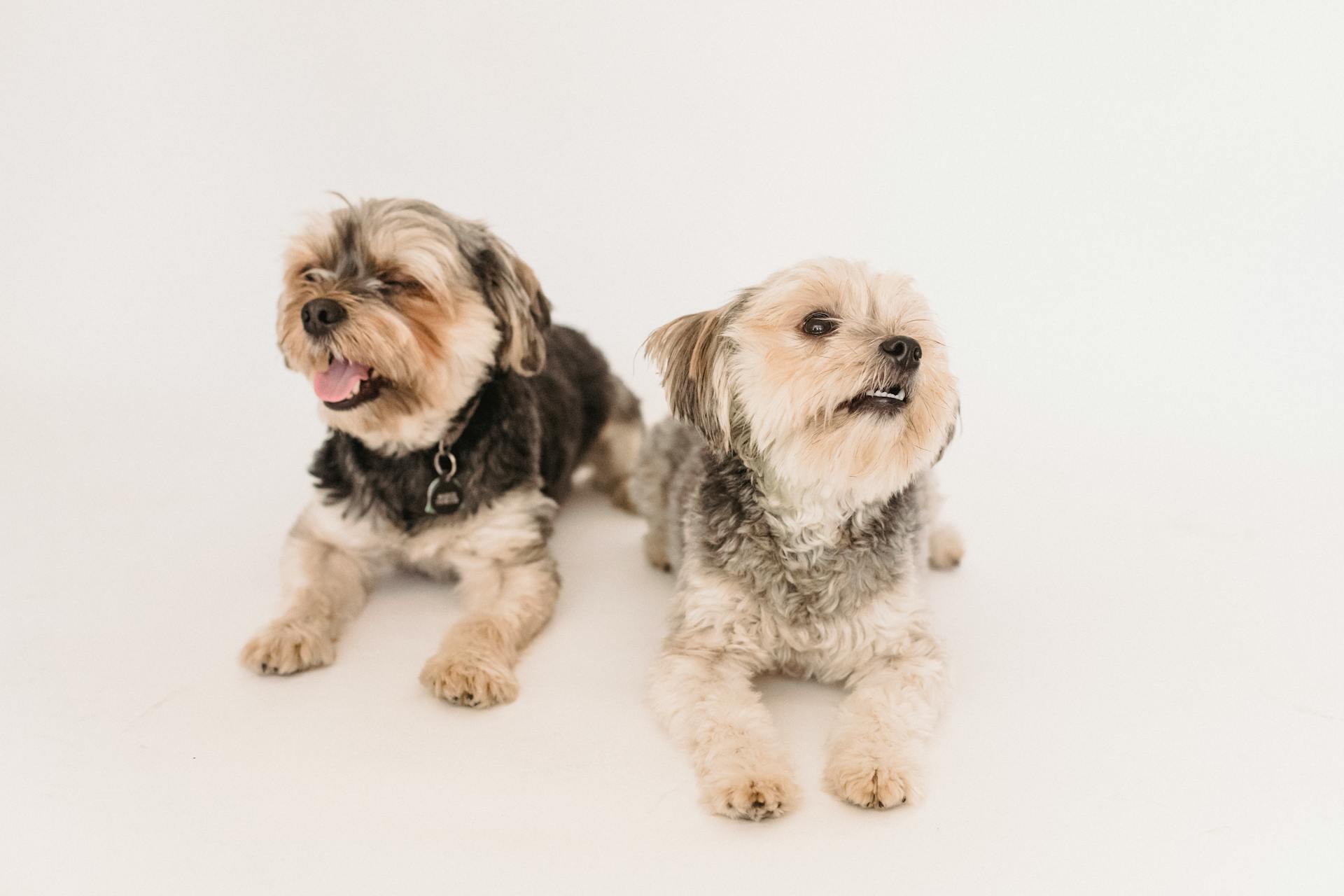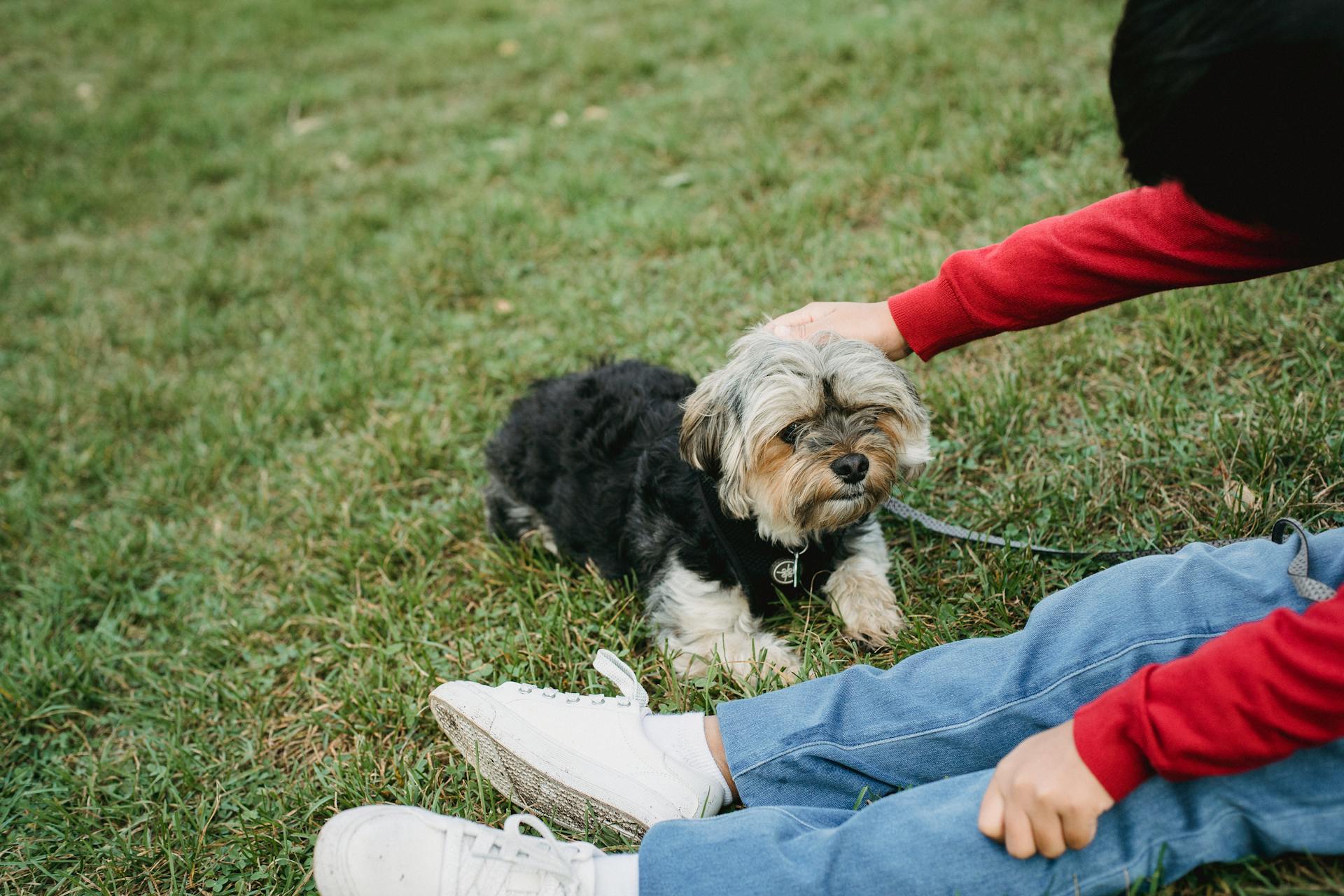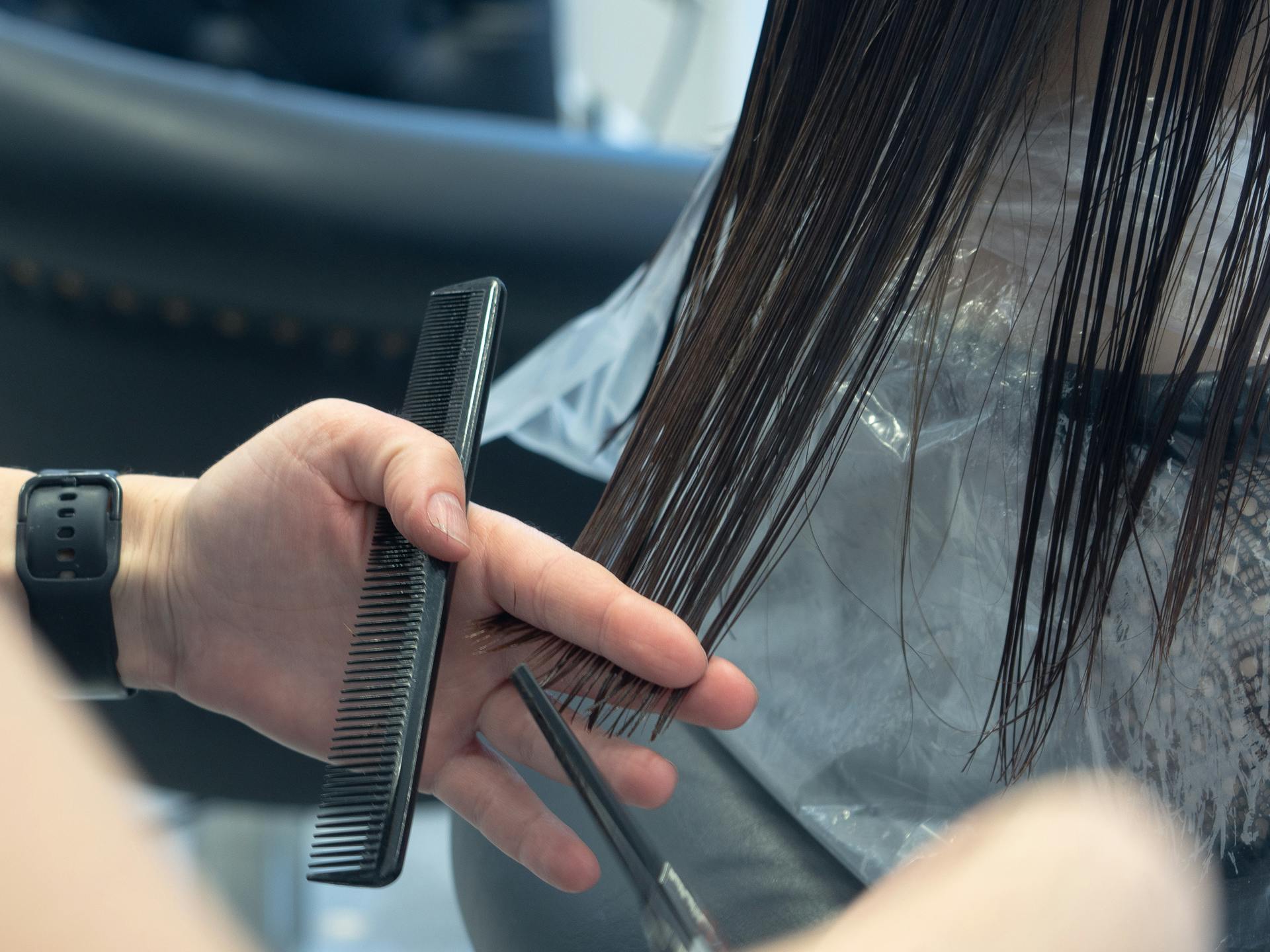
Welcoming a new Yorkshire Terrier puppy into your family is a thrilling experience, but it requires careful attention to ensure they grow into happy and healthy adults.
Yorkshire Terriers are tiny, but they need plenty of food to sustain their high energy levels. Feed them 3-4 times a day until they're about six months old, then gradually switch to twice a day.
Choose a high-quality puppy food that's formulated for small breeds, and always follow the manufacturer's instructions for feeding amounts. Yorkshire Terriers can be prone to hypoglycemia, so it's essential to feed them regularly and not miss a meal.
Puppies need plenty of sleep, too - aim for 18-20 hours of rest per day, divided into short naps and longer periods of sleep.
Check this out: Boston Terrier Day
Temperament & Personality
Yorkshire Terriers are bundles of fun, but they're not for every family. They're more assertive and playful than their 'companion' status would suggest, but they still love to be around people.
To ensure a harmonious household, it's essential to introduce Yorkies to other pets correctly from a young age. They're happy to live with other dogs and cats if introduced correctly, but should be watched around small pets as they're hardwired to chase.
Yorkies are intelligent and busy dogs that need appropriate outlets for all that energy. They thrive on attention and activity, and won't be happy being toted everywhere.
Here are some key personality traits to keep in mind:
- Assertive and playful
- Fun, feisty, and love to chase
- Happy to live with other dogs and cats if introduced correctly
- Hardwired to chase small pets
- Intelligent and busy
- Need appropriate outlets for energy
- Thrive on attention and activity
As a Yorkie owner, it's crucial to set limits and start training early. Spoiling them can lead to mischievous behavior, so be sure to establish a routine and stick to it. Socialization is also essential, as it helps ensure your Yorkie will be a friendly, well-rounded dog.
Training and Behavior
Yorkshire Terriers are naturally eager to please, but they can be slow to housetrain. Good socialisation from early on will help to ensure they are used to unexpected events.
Training is most successful when based on positive reinforcement with praise and tasty treats. Keep sessions short and fun to keep your Yorkie pup engaged. Yorkies are scrappy dogs with outsized personalities and can develop bad habits if they’re not sufficiently trained and provided with mental and physical stimulation.
Here are some important training considerations for Yorkies:
- Provide consistent, balanced training to help them thrive.
- Expose your Yorkie to all kinds of stimuli when they’re young, if possible.
- Take obedience classes for training and socialization.
- Keep them active with at least 30-45 minutes of walking and exercise per day.
Training and Behavior
Yorkshire Terriers are intelligent dogs that thrive with consistent, balanced training. They can be slow to housetrain, but with good socialisation from early on, they'll learn quickly.
Yorkies are naturally eager to please and will learn quickly, but they can be slow to housetrain. Good socialisation from early on will help to ensure they're used to unexpected events, such as busy environments and attention from young children.
A key aspect of Yorkie training is socialization. Exposing your Yorkie to various stimuli from an early age will help them become confident and friendly. Taking obedience classes is an excellent way to train and socialize your Yorkie.
Broaden your view: Bull Terrier Dog Training
Yorkies need regular exercise to burn off energy and prevent territorial behavior and excessive barking. Aim for at least 30-45 minutes of walking and exercise per day, and consider playtime activities like scent games or fetch.
Here's a breakdown of the essential training considerations for Yorkies:
- Socialization: Expose your Yorkie to various stimuli from an early age, and consider taking obedience classes.
- Exercise: Provide at least 30-45 minutes of walking and exercise per day, and engage in playtime activities like scent games or fetch.
- Bark management: Regular exercise can help reduce fear, stress, and boredom, which contribute to excess barking. Avoid rewarding barking behavior with attention.
Terrier
Training a Yorkshire Terrier requires patience and consistency. They are intelligent dogs and can be quick learners, so obedience training and agility exercises can be a great way to keep them mentally stimulated.
Yorkies are known for their big personalities despite their small size, so they can be bold and confident at times. Regular exercise is essential to keep them physically and mentally healthy.
To keep your Yorkie in good condition, vets recommend feeding them a breed-appropriate, high-quality pet food two to three times a day. Stick to the portion sizes on the packaging and consider including a dry food to help fend off gum disease.
A different take: Training Rat Terrier
Yorkies have a lot of energy, so they enjoy playtime and short walks. To keep them healthy, it's essential to provide regular exercise and mental stimulation.
Here's a rough guide to Yorkie exercise needs:
By following these exercise guidelines and providing regular mental stimulation, you can help your Yorkie stay happy and healthy.
Grooming and Health
Yorkshire Terrier puppies require a significant amount of grooming to prevent tangles and knots in their long, silky coats. Regular brushing is essential to keep their fur healthy and looking its best.
Daily brushing can help to prevent matting of their long fur, especially if they have a full-length coat. This can be done with a small pin brush, like the Kenchii Oval Metal Pin Brush.
A professional groomer should be consulted every six to eight weeks for a haircut to maintain a healthy and attractive coat. They will be able to help you choose from a number of cuts and styles, including a trimmed-all-over 'puppy cut' for those who prefer shorter hair.
Broaden your view: Do Maltese Dogs Have Hair or Fur
Grooming Needs
Yorkshire Terriers require a high level of grooming due to their long, silky coat. This coat continues to grow, much like human hair, and needs regular attention.
Daily brushing is essential to prevent matting of their long fur. Regular brushing also helps to prevent tangles and knots, especially if your Yorkie has a full-length coat.
If your Yorkie's coat is kept full-length, you'll need to brush them daily. A small pin brush is a great tool for the job, and can help to keep their coat looking its best.
Professional grooming is also a must for Yorkies. Plan on taking your Yorkie to the groomer every six to eight weeks for a haircut. This will help to keep their coat healthy and looking attractive.
Here's a quick rundown of the grooming needs of Yorkies:
- Daily brushing to prevent matting and tangles
- Professional grooming every 6-8 weeks for a haircut
- Regular haircuts to keep their coat looking its best
Yorkies also benefit from regular haircuts from a professional groomer. This will help you choose from a number of cuts and styles to suit your dog's personality and your personal preferences.
Eye
Yorkies often develop tear stains at the corners of their eyes, so it's a good idea to wipe their eyes with a wet cloth or use an eye cleaning solution daily to prevent buildup.
Keeping the hair around their eyes short or pulled back is also a must, as it can irritate their eyes or obscure their vision.
Cataracts are a common cause of blindness in older Yorkies, so it's essential to watch for cloudy lenses when examining your dog.
Dry eye, or keratoconjunctivitis sicca, is also common in Yorkies, causing sore, itchy eyes and infections.
Symptoms of dry eye include a dull, dry appearance or thick discharge from the eyes, squinting, and pawing at the eyes.
If you notice any of these signs, call your vet immediately for a tear test and to get a prescription for ointment to apply for the rest of your dog's life.
If this caught your attention, see: Yorkshire Terrier Dry Skin
Ear
Taking care of your dog's ears is crucial for their overall health. Checking their ears weekly can help prevent ear infections.
Readers also liked: Yorkshire Terrier Floppy Ears
Dirty ears can be a sign of an ear infection, so keep an eye out for heavy debris or redness. Schedule a vet visit if you notice either of these symptoms.
Using the right ear cleaner for your dog's specific breed is essential. Ask your veterinarian for a recommendation, such as one for your Yorkshire Terrier.
Feeding and Nutrition
Yorkshire Terrier puppies should be fed a diet formulated specifically for puppies or designated for “all life stages” to ensure they receive a complete and balanced diet.
Feeding three to four small meals per day can help maintain their blood sugar.
A kibble designed for small mouths is best for Yorkshire Terriers, making it easier for them to eat and reducing the risk of choking.
Yorkie adults do well with two to three feedings per day, and a dental-focused diet may be recommended by your veterinarian to help prevent dental disease.
To determine your dog's meal sizes, talk with your veterinarian, who can calculate your Yorkshire Terrier's caloric needs based on their physical size, metabolism, neuter status, and activity level.
Recommended read: Maltese Small Breed Dogs
The feeding guide labels on dog food provide valuable information to help you make informed decisions about your puppy's diet.
Treats should never make up more than 10% of a dog's daily calories, so offer them mindfully.
Healthy Yorkshire Terrier dogs should receive all necessary nutrients from their AAFCO-approved dog food, but your veterinarian may recommend certain supplements depending on their specific health needs.
Omega-3 fatty acids (DHA/EPA) can be beneficial for Yorkies, acting as natural anti-inflammatories that support the skin, coat, kidneys, joints, and heart.
Health Concerns
Yorkshire terriers are prone to several health concerns that you should be aware of as a responsible owner. Microvascular Dysplasia (MVD) is a common issue in small breeds, which can lead to liver problems and other complications.
Regular dental care is crucial for Yorkies, as they are prone to dental disease. Daily tooth brushing with a pet-specific toothpaste can help prevent this issue. Routine dental cleanings under anesthesia are also recommended to evaluate the mouth, remove plaque and tartar, and polish teeth.
To keep your Yorkie healthy, monitor their weight and ensure they don't become obese, as this can contribute to various health problems. Be aware of signs of patellar luxation, such as a kneecap slipping out of place, and seek veterinary care if you notice any unusual behavior.
Some common health issues in Yorkies include Portosystemic Shunts (PSS), Protein-Losing Enteropathy (PLE), Degenerative Myelopathy (DM), and Intervertebral disc disease (IVDD). These conditions can cause a range of symptoms, from weight loss and vomiting to paralysis and loss of coordination.
Here are some common health issues in Yorkies and their symptoms:
- Portosystemic Shunts (PSS): weight loss, vomiting, diarrhea, and a buildup of ammonia and other toxins
- Protein-Losing Enteropathy (PLE): severe weight loss, diarrhea, and accumulation of fluid in the abdomen
- Degenerative Myelopathy (DM): muscle atrophy, loss of coordination, and difficulty walking
- Intervertebral disc disease (IVDD): sudden paralysis, hunched back, and refusal to move or eat
Vital Stats
As we explore the health concerns of our beloved pets, it's essential to consider the vital stats that can impact their overall well-being. Here are some key facts to keep in mind.
Yorkshire Terriers are a relatively small breed, requiring careful consideration of their exercise needs. They need at least 30 minutes of exercise per day to stay happy and healthy.
See what others are reading: How Much Exercise Does a Yorkshire Terrier Need

The breed's long-haired coat requires daily grooming to prevent matting and tangling. This can be a time-consuming task, but it's crucial for maintaining their coat's health.
One of the benefits of owning a Yorkshire Terrier is their relatively long lifespan. With proper care, they can live into their late teens, making them a long-term companion.
Here's a quick rundown of the breed's vital stats:
Their intelligent and independent nature means they can be strong-willed at times, but with patience and consistency, they can thrive under your care.
Genetic Predispositions
Yorkshire Terriers are prone to a range of genetic predispositions that can affect their health. Microvascular Dysplasia (MVD) is an abnormality of the blood vessels in the liver that's common in small dogs, including Yorkies and Cairn terriers. This condition can lead to portosystemic shunts, or liver shunts, which can cause a buildup of ammonia and other toxins in the body.
Some Yorkies may also be born with Protein-Losing Enteropathy (PLE), a serious intestinal disease that can cause severe weight loss, diarrhea, and fluid accumulation in the abdomen. Degenerative Myelopathy (DM) is another neurological disease that affects Yorkies, causing muscle atrophy and loss of coordination. This condition is similar to amyotrophic lateral sclerosis (Lou Gehrig's disease) in humans.
Intriguing read: Liver English Springer Spaniel

Yorkies are also prone to knee problems, particularly patellar luxation, where the kneecap slips out of place. This can cause frequent dislocations and may lead to arthritis. Young Yorkies may also be at risk for Legg-Calve-Perthes disease, a painful hip condition that requires surgery.
Here are some common genetic predispositions in Yorkies:
Regular veterinary check-ups and preventative care can help manage these genetic predispositions and ensure your Yorkie lives a long and healthy life.
Parasites
Parasites are a serious concern for your Yorkie's health. All kinds of worms and bugs can invade her body, inside and out.
Fleas, ticks, and ear mites can infest her skin and ears. These parasites can cause pain and discomfort for your furry friend.
Hookworms, roundworms, heartworms, and whipworms can get into her system by drinking unclean water, walking on contaminated soil, or being bitten by an infected mosquito. These parasites can be transmitted to you or a family member.
It's essential to test for these parasites on a regular basis to ensure your Yorkie's health and safety. Regular testing will help prevent any potential health issues.
Eye Problems

Eye problems can have a significant impact on your dog's quality of life. Yorkshire Terriers are prone to various eye conditions, some of which can cause blindness if left untreated.
Cataracts are a common cause of blindness in older Yorkies, causing the lenses of their eyes to become more opaque and cloudy. Surgery to remove cataracts and restore sight may be an option.
Dry eye, also known as keratoconjunctivitis sicca or KCS, is a painful condition common in Yorkshire Terriers. KCS reduces tear production, leading to sore, itchy eyes and infections.
Symptoms of KCS include a dull, dry appearance or thick discharge from the eyes, squinting, and pawing at the eyes. If you notice any of these signs, it's essential to call your veterinarian immediately.
If your Yorkie is diagnosed with KCS, a tear test will be conducted to confirm the condition. A prescription ointment will be required to apply for the rest of your dog's life to help manage the condition.
Here are some common eye problems in Yorkshire Terriers:
- Cataracts: a common cause of blindness in older Yorkies
- Keratoconjunctivitis sicca (KCS): a painful condition that reduces tear production, leading to sore, itchy eyes and infections
Allergies
Allergies can be a real nuisance for our furry friends. Symptoms typically start between the ages of one and three.
Yorkies often suffer from skin allergies, also known as atopy, which makes their skin itchy. The feet, belly, folds of the skin, and ears are most commonly affected.
Licking the paws, rubbing the face, and frequent ear infections are common signs of allergies in dogs.
Worth a look: English Bulldog Skin Infection
Retained Puppy Teeth
Retained puppy teeth can cause a range of problems if left untreated.
Dogs typically start losing their primary teeth at around 4 months of age.
Retained puppy teeth can crowd the incoming adult teeth, leading to food and hair getting trapped between the teeth and causing cavities and infections.
This is more common in small breeds like Yorkshire Terriers.
If left untreated, retained puppy teeth can result in painful gums, bad breath, and even adult tooth loss.
For more insights, see: Yorkshire Terrier Teeth Problems
Care and Considerations
Yorkshire Terriers are affectionate, playful, and sometimes bossy little dogs that have a lot of energy and need to be mentally stimulated.
They require frequent brushing and regular grooming, even if you keep their coat cut short, to prevent matting and tangling.
Make sure to research pet insurance plans before bringing home a Yorkie puppy, as this small breed is prone to health conditions including liver shunts and hypoglycemia.
Daily tooth brushing will delay dental disease in Yorkies, so be sure to establish a regular oral hygiene routine.
Yorkies don't tolerate cold weather well, so you might need to protect them with dog coats or stylish sweaters when venturing out.
Issues
Yorkshire Terriers are a relatively healthy breed, but they do have their share of medical issues. The typical Yorkie lifespan is long, at 11–15 years. Pet health insurance might be a good investment when bringing home a Yorkie puppy.
Pet Care Considerations
Yorkshire Terriers are wonderful companions, but they do require some special attention. They can be a bit bossy and barky, but with the right care, they'll thrive.
Yorkies have extensive grooming needs due to their long, hair-like coats, so be prepared for regular brushing and grooming sessions.
It's essential to research pet insurance plans before bringing home a Yorkie puppy, as they're prone to health conditions like liver shunts and hypoglycemia. Daily tooth brushing can delay dental disease, so make sure to prioritize oral hygiene.
Yorkies don't tolerate cold weather well, so you may need to protect them with dog coats or stylish sweaters. Regular exercise and a balanced diet are also crucial for their overall health and happiness.
Signing up for pet health insurance is a vital step in caring for your Yorkie, as it'll help cover the costs of medical tests and procedures throughout their life. Regular veterinary check-ups and vaccinations are also essential for keeping your Yorkie healthy.
Consider reading: American Bully Coats
Children and Pets
When considering bringing a Yorkshire Terrier into your home, you'll want to think carefully about whether they're a good fit for your family.
Most breeders won't sell puppies to people with young children, as it's easy for kids to accidentally harm them. Children under 5 or 6 years old are generally too young to understand how to handle a Yorkie gently.
Yorkies can get along well with other pets, including cats, if socialized with them early on. In fact, they can be quite bold and protective of their feline friends.
However, it's essential to remember that Yorkies can be quite feisty and might not get along with other dogs, even if they're much larger.
Size
Yorkshire Terriers are known to be inconsistent in size, with some weighing as little as four pounds and others growing to 12 to 15 pounds.
In fact, it's not uncommon for a single litter to have Yorkies of varying weights, making it a good idea to research the breeder and ask about the health of their dogs.
Yorkshire Terriers should be around 8 to 9 inches at the shoulder and weigh no more than seven pounds, with four to six pounds being the preferred range.
Beware of breeders who claim to have "teacup" Yorkshire Terriers, as these dogs are prone to genetic disorders and are at a higher health risk.
Frequently Asked Questions
How many hours can a Yorkie be left alone?
Yorkies can be left alone for about 4-5 hours, but they require regular socialization and interaction to prevent boredom and stress.
Sources
- https://www.petplan.co.uk/pet-information/dog/breed/yorkshire-terrier/
- https://dogtime.com/dog-breeds/yorkshire-terrier
- https://www.petmd.com/dog/breeds/yorkshire-terrier
- https://www.thefarmersdog.com/digest/yorkie-breed-guide-personality-training-food-and-more/
- https://www.advancedanimalcare.com/services/dogs/breeds/yorkshire-terrier
Featured Images: pexels.com


